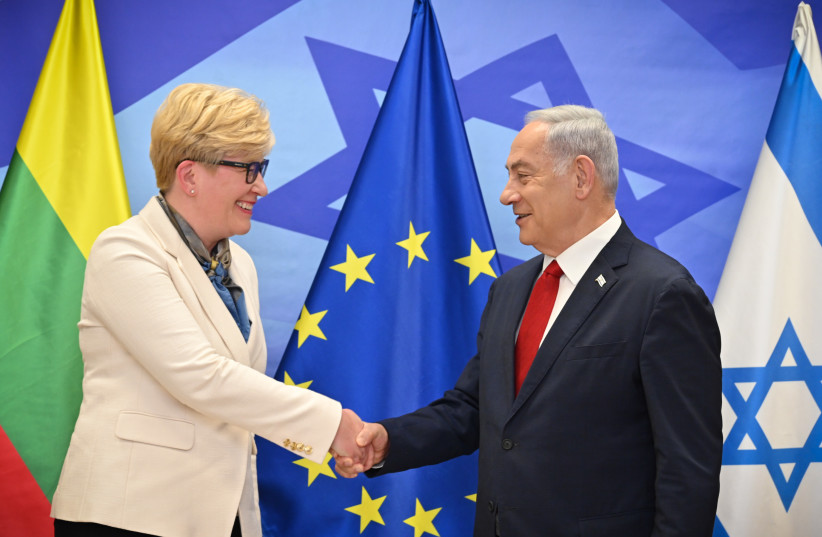Israel must join the circle of democracies that have increased their support for Ukraine, Lithuanian Prime Minister Ingrida Simonyte told The Jerusalem Post on Monday, as she sat in Jerusalem but had her wary eyes on Russia.
“I will plea for all the support that can be provided by Israel,” she said prior to meeting Prime Minister Benjamin Netanyahu, as she hinted that Israel should provide Ukraine with weapons, a red-line that it has refused to cross so far.
“Lithuania started to provide Ukraine with weapons before the invasion. Some other countries did so much later after the invasion. I keep saying that every day, that countries are still thinking about it [and] are still not ready to do it, it’s costing lots of human lives.”
After her conversation with Netanyahu later in the day, her spokesperson said that Simonyte had “raised the issue of Israel’s support to Ukraine, stressing the importance of preserving the rules-based world order.”
“We see this fight in Ukraine as a line of defense of democracies against the autocracies.
“We see that if Russia is allowed to somehow win this, then there will be no peace in Europe. For other autocrats that will be encouragement for trying their chances in other regions,” Simonyte said.

Threats from the former Soviet Union leave lasting mark
The issue is a personal one for Lithuania, which had been under the rule of the former Soviet Union, and for Simonyte, who grew up in that era.
Lithuania is, therefore, raising the issue of improved support for Kyiv “with every democratic partner that we have across the globe,” she said.
Just five or 10 years ago, many believed that Russia would never invade Ukraine, she explained. The possibility remains that Russia would invade other countries, she said, explaining that countries in her region are increasing their defense budget and the North Atlantic Treaty Organization has expanded its membership.
Russia in its new military doctrine said it is “preparing for a long-term confrontation with the West,” but this time, she said, her country was within a Western alliance and not part of the Russian bloc.
Concern over Moscow’s future moves has highlighted for Lithuania the dangers a nuclear Iran would pose, particularly given that Russia’s veto at the United Nations Security Council neuters it on this issue and would make it impossible to reimpose crippling sanctions on Iran.
“We have a sad situation where an aggressor sits on the Security Council and does not allow it to decide what is happening in Ukraine,” Simonyte said.
Iranian-Russian ties
Moscow and Tehran have tightened their military alliance, with Iran selling attack drones to Russia for use against Ukraine.
In this partnership, Russia receives Iranian drones and in exchange “Iran gets a cover for what it does with its nuclear program. This is a very worrisome situation and I think that we need to take that seriously,” she said.
Lithuania has been a strong advocate within the European Union both for the imposition of sanctions against companies that are connected to Iranian drone productions as well calling for the designation of Iran’s Islamic Revolutionary Guard Corps as a terror group.
“This is our task, to raise awareness, to push, to persuade,” she said.
In a speech to the American Jewish Committee the night before, she lauded Israel’s role in suppressing Iran’s nuclear program.
“We all know that Israel’s defensive systems remain the best antidote against Iranian weapons,” she said.
Netanyahu told Simonyte during their meeting that a nuclear Iran would harm regional stability and threaten the entire world, his office said.
He also touted the strong ties between the two countries.
During her interview with the Post, Simonyte said she has not been among the international leaders who have sounded the alarm with respect to Israel’s judicial overhaul program.
“This is an internal question for Israel and this is for the Israeli politicians to find a solution. So far I just have my belief in [the] Israeli people and politicians’ commitment to democracy and the rule of law,” she explained.
“I know that this is controversial. I know that people have their opinion about this. They come and show this opinion in the public spaces of Israel and this proves that the country is a democracy,” Simonyte said, adding that she did believe that a compromise plan was the best path forward.
Simonyte spoke of the importance of combating antisemitism, which she said was an “ideology of hate,” particularly in light of the Holocaust, a tragedy that she never learned in her Soviet-run school.
“It took time... to understand the magnitude... to understand the underlying ideology and the magnitude of the tragedy.”
It is difficult to imagine how in some cases 40% or even 80% or 90% of entire cities and towns were eliminated.
“My country would be completely different if that had not happened,” she said.
Lithuania has been criticized for not doing enough to expose those who collaborated with the Nazis. Simonyte said she has been among those who have advocated that the country faces the “inconvenient truth about the past in Lithuania, also including the people who collaborated with Nazis.” She has also supported the compensation of Jews for property loss.
Simonyte, for whom this was her first visit to Israel since taking office in 2020, talked about the similarities of the two countries in that they both “had to fight for their place in the world... We have a very similar understanding that the security of the country is a No. 1 priority because if you do not have security, you do not have democracy. We are small countries, so our biggest asset is our people.”
